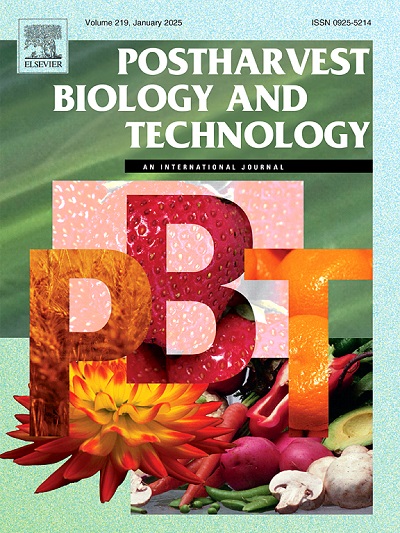低温通过DlMYB108-DlPME17转录调控延缓龙眼果肉分解
IF 6.8
1区 农林科学
Q1 AGRONOMY
引用次数: 0
摘要
采后果肉降解严重制约了桂圆的保质期和商业价值。本研究发现了一个以DlMYB108-DlPME17调控模块为中心的温度响应转录网络,该转录网络控制龙眼牙髓变质。生理分析表明,与25°C相比,10°C通过保持细胞壁完整性和抑制水解酶活性有效地延缓了牙髓降解。转录组学分析鉴定出9372个差异表达基因,细胞壁代谢显著富集。其中,DlPME17 (dl .04g002100.1)表现出与降解过程相关的显著上调。分子鉴定鉴定DlMYB108为核定位转录激活子,表现出低温抑制表达。DlMYB108直接结合DlPME17启动子并激活其表达。这些发现表明DlMYB108通过转录控制DlPME17成为果胶分解的关键调控因子,为揭示采后龙眼品质恶化的分子机制提供了新的见解。本文章由计算机程序翻译,如有差异,请以英文原文为准。
Low temperature delays longan pulp breakdown through DlMYB108-DlPME17 transcriptional regulation
Postharvest pulp degradation significantly constrains the shelf life and commercial value of longan fruits. This investigation revealed a temperature-responsive transcriptional network centered on the DlMYB108–DlPME17 regulatory module that controls longan pulp deterioration. Physiological analyses demonstrated that 10 °C effectively delayed pulp degradation by maintaining cell wall integrity and inhibiting hydrolase activities compared with 25 °C. Transcriptomic profiling identified 9372 differentially expressed genes, with cell wall metabolism being significantly enriched. Among these, DlPME17 (Dil.04g002100.1) exhibited substantial upregulation correlating with degradation progression. Molecular characterization identified DlMYB108 as a nuclear-localized transcriptional activator demonstrating low-temperature inhibitory expression. DlMYB108 directly binds to the DlPME17 promoter and activates its expression. These findings establish DlMYB108 as a critical regulator of pectin disassembly through transcriptional control of DlPME17, offering insights into the molecular mechanisms underlying postharvest longan quality deterioration.
求助全文
通过发布文献求助,成功后即可免费获取论文全文。
去求助
来源期刊

Postharvest Biology and Technology
农林科学-农艺学
CiteScore
12.00
自引率
11.40%
发文量
309
审稿时长
38 days
期刊介绍:
The journal is devoted exclusively to the publication of original papers, review articles and frontiers articles on biological and technological postharvest research. This includes the areas of postharvest storage, treatments and underpinning mechanisms, quality evaluation, packaging, handling and distribution of fresh horticultural crops including fruit, vegetables, flowers and nuts, but excluding grains, seeds and forages.
Papers reporting novel insights from fundamental and interdisciplinary research will be particularly encouraged. These disciplines include systems biology, bioinformatics, entomology, plant physiology, plant pathology, (bio)chemistry, engineering, modelling, and technologies for nondestructive testing.
Manuscripts on fresh food crops that will be further processed after postharvest storage, or on food processes beyond refrigeration, packaging and minimal processing will not be considered.
 求助内容:
求助内容: 应助结果提醒方式:
应助结果提醒方式:


